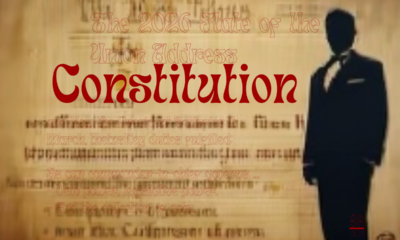Constitution
The FBI: should we save it?
Should America even have an FBI? If so, what jurisdiction should it have? This agency has gone rogue and we must answer those questions.
The Federal Bureau of Investigation has existed, in one form or another, for 114 years. Today the Trump Raid angers most of the American people but excites the rest. But the very history of the FBI has created or exacerbated a problem since its beginnings. Every dirty, rotten thing the FBI has done this month, has its roots in that 114-year history. Any attempt to salvage and reform the FBI must take account of that history. Furthermore, the American people must reckon with their deadly tendency to opt for easy fixes to admittedly vexing problems.
Latest on the FBI and the Trump Raid
As everyone knows, South Florida Magistrate Judge Bruce Reinhart unsealed the search warrant the FBI used in the Trump Raid. That’s not good enough for Donald Trump and his team, as they have made clear. They moved to unseal the supporting affidavit for the warrant. On Thursday, August 18, Judge Reinhart held a hearing. There the FBI actually said the investigation was in the early stages, so any release of information would “tip off” its targets.
With whom, one may ask, does the FBI want to convince the American public they are dealing? With a former President of the United States, who lost by a narrow but spread-out popular vote margin? Or with a dangerous gangster, or worse, a Latin American style dictator?
At last report, Judge Reinhart has ordered the FBI to propose its own redactions to that affidavit. He wants that proposal by Thursday, August 25. Trump will not settle even for that. He now announces that he will sue the FBI over violations of the Fourteenth Amendment. Though he won’t say (yet) how he will challenge the search warrant, CNAV can guess. He will allege that the FBI lacked probable cause. Better still, he might say the warrant violates the particular description clause. This strikes CNAV as the more powerful argument, because that warrant looks less like an American-style search warrant and more like a British-style writ of assistance. (Which is a general, look anywhere and everywhere for anything and everything warrant.)
Did the FBI commit fraud to get the warrant?
But we hear of much more. Paul Sperry (posting on an alternative platform) posts some disturbing questions about how the FBI got that warrant. Never mind the possible conflicts of interest Judge Reinhart might have. Sperry accuses the FBI of omitting exculpatory evidence in making its case to the judge.
Where is the May subpoena for Mar-a-Lago records, and where is the June inventory receipt the FBI would have given Trump lawyers Corcoran & Bobb, who VOLUNTARILY handed over docs from Trump’s storage to investigators? Let’s see those docs, along with the affidavit.
And where is the June subpoena and inventory receipt the FBI would have furnished Trump’s lawyers who VOLUNTARILY handed over surveillance footage to investigators? Let’s see those docs, too.
If these documents or references to them are missing from the affidavit for the August search warrant, then the FBI omitted exculpatory evidence of prior Trump cooperation from the court, which would be a fraud on the court similar to the fraud on the FISA court the FBI committed in the Crossfire Hurricane case.
Someone is leaking information, by the way. Whoever it is, says the FBI told the judge if they didn’t seize the documents, Trump would soon destroy them.
We have known since shortly after the raid that the FBI was after information from the Crossfire Hurricane investigation. Obviously that would discredit the Bureau. We now learn that the Trump Raiders are the same agents from the Crossfire Hurricane Team.
Christopher Wray has created worse problems
But Rep. Jim Jordan (R-Ohio) and others now tell us the FBI has serious problems in its own organization. They’ve had those problems for years, but arguably their current Director, Christopher Wray, has made them worse. The Bureau has two kinds of problems that should concern everyone. First, they are running roughshod over Americans’ liberties, and not merely those of Donald Trump. Second, the Bureau has fired some agents who object to these practices. So not only do we see agents saying,
We didn’t sign on for this kind of nonsense.
We also see a Director effectively saying,
OK, fine. There’s the door, and don’t let it hit you on the way out.
And how do we know this? Because fourteen FBI agents have told this story to Rep. Jordan.
Fourteen FBI agents have come to our office as whistleblowers, and they are good people. There are lots of good people in the FBI. It’s the top that is the problem.
Some of these good agents are coming to us, telling us what’s going on, the political nature now of the Justice Department, talking about the school board issue, about a whole host of issues.
By “school board issue” Jordan means a memo from Attorney General Merrick Garland telling the FBI to treat parents who express concern about public school curriculum and other “woke” policies, as domestic terrorists.
Yes, we said fired
Rep. Jordan goes on:
It’s becoming a well-worn trail of agents who say this has got to stop, and thank goodness for them and that American people recognize it, and I believe they’re going to make a big change on November 8.
But Director Wray has also been purging his Bureau. Rep. Jordan gives details in his angry letter to Wray:
We continue to investigate allegations that the Federal Bureau of Investigation is retaliating against FBI employees for engaging in disfavored political speech. On May 6, 2022, we sent you a letter that detailed examples of the FBI suspending the security clearances of FBI employees for their participation in protected First Amendment activity.
To date, you have failed to acknowledge our letter or begin to arrange for the requested briefing. Since our May 6 letter, we have received new protected whistleblower disclosures that suggest the FBI’s actions are far more pervasive than previously known. Multiple whistleblowers have called it a “purge” of FBI employees holding conservative views.
As one example, the FBI targeted ———– , who works in the FBI’s ———- by suspending security clearance and eventually indefinitely suspending ——— from duty and pay. ———- had apparently shared personal views that the FBI was not being entirely forthcoming about the events of January 6. As a result, the FBI determined that ——– had “espoused conspiratorial views” and “promoted unreliable information which indicates support for the events of January 6,” and therefore the FBI questioned ——- allegiance to the United States.
History of the FBI
Rep. Jordan sent that letter in June. The FBI detailed original Crossfire Hurricane agents to raid Trump’s house in August. So what’s going on?
The better question is, how long has this sort of thing been going on? Answer: almost since the Bureau’s founding. Contrary to popular belief, the FBI did not begin as a response to the notorious 1929 “Saint Valentine’s Day Massacre.”
The FBI didn’t even gets its current name until six years after that event. But its history goes back to 1908.
The FBI has likely sanitized that history – and carries it no further than 2014. But one can trace its beginnings, and the “jurisdiction creep” that let it grow to the Bureau we know today. This “jurisdiction creep” has several milestones:
1910: the White Slave Traffic Act, or Mann Act, creating a category of interstate crime.
1917: the Espionage Act, two months after American entry into the First World War.
1919: the Motor Vehicle Theft Act, or Dyer Act, making interstate transportation of stolen motor vehicles a Federal beef. Aficionados of the Quinn Martin TV show The FBI will remember that interstate transportation of stolen property of any kind is a Federal beef.
1924: the future FBI gains its Identification Division. In that same year, J. Edgar Hoover became Acting, later permanent, Director of the Bureau of Investigation.
1932: the Federal Kidnapping Act. This was a response to the Lindbergh Kidnapping. It granted the Bureau jurisdiction should kidnappers transport their hostage across State lines.
More milestones
1934: Bureau agents gain the direct power of arrest and authority to carry weapons. In that year Bureau agents scored their first kill: John Dillinger.
1935: the FBI gets its current name. From 1934 to 1975, the FBI occupied space in the Justice Department’s headquarters.
1939: the FBI starts investigating subversive activities in addition to espionage and sabotage.
1940: the six-year history of the Special Intelligence Service begins. Though President Harry S. Truman closed it in 1946, it set the precedent for stationing FBI agents overseas. Also in that year, the Bureau set up its Disaster Squad – not a law-enforcement function.
1946: the Atomic Energy Act, giving the FBI authority over “nuclear secrets.” Note that this is part of the beef with Trump.
1947: Executive Order 9835, setting up the Federal Employees Loyalty Program.
1950: first list of the Ten Most Wanted Fugitives. (Actor Efrem Zimbalist, Jr. would occasionally spotlight one such fugitive after an episode of the Quinn Martin show. Angela Davis drew the dubious distinction of having the actor mention her name in this connection.)
1956-71: COINTELPRO.
1967: creation of the National Crime Information Center (NCIC).
1968: Public Law 90-351, specifying Presidential appointments of FBI Directors.
1970: the Organized Crime Control Act, and the Racketeer Influenced and Corrupt Organizations Act.
1972: death of J. Edgar Hoover.
1973: the Year of Three Directors.
1975: the FBI gets its own headquarters. Also: the “Second Battle of Wounded Knee.”
1981: ABSCAM.
1983: the Hostage Rescue Team.
Is the FBI extra-Constitutional?
The FBI has many more milestones, but these are the most important. They set the precedents for the things the Bureau does today. And much of this is likely extra-constitutional.
The Constitution grants a limited set of law-enforcement powers to Congress. Article I, Section 8 reads in relevant part:
The Congress shall have Power to…
Provide for the Punishment of counterfeiting the Securities and current Coin of the United States;…
Define and punish Piracies and Felonies committed on the high Seas, and Offences against the Law of Nations;…
Exercise exclusive Legislation in all Cases whatsoever, over such District (not exceeding ten Miles square) as may, by Cession of particular States, and the Acceptance of Congress, become the Seat of the Government of the United States, and to exercise like Authority over all Places purchased by the Consent of the Legislature of the State in which the Same shall be, for the Erection of Forts, Magazines, Arsenals, dock-Yards, and other needful Buildings;—And to:
Make all Laws which shall be necessary and proper for carrying into Execution the foregoing Powers, and all other Powers vested by this Constitution in the Government of the United States, or in any Department or Officer thereof.
This included Prohibition, from 1918 through 1934.
Where’s the Federal beef?
So it would seem that the only legitimate “federal beef” within the States is minting or printing counterfeit coin, currency, bonds, or the like. Where does the Constitution grant jurisdiction over bank robbery? Or kidnapping, or even interstate transportation of stolen motor vehicles or other property? Anything of the kind happening in an Article I, Section 8, Clause 17 place would certainly be a Federal beef. So also would be a crime in a Federal territory not within a State. Article IV Section 3 Clause 2 (the Needful Rules and Regulations Clause) makes that clear.
Next, the Crime on the High Seas Clause defines federal jurisdiction over piracy and any felonies in which a U.S. national is either victim or suspect. Last of all, the power to define and enforce secrets derives from the power and directive to “provide for the common defense.” So, because the federal government has secrets, it must have an agency to guard those secrets.
So the FBI does have legitimate purposes. But Congress began to extend its jurisdiction beyond what the Constitution provides. And lately the FBI has taken certain matters upon itself.
The worst complaint against the FBI is the conduct of its current Director regarding the January 6 Event. From two separate sources we learn that the FBI had twenty “assets” “embedded” in the Trump rally crowd. At least one person refused recruitment as an informant and is now languishing in a Florida prison.
Whither the FBI?
So the FBI has two problems. First, though it has some Constitutionally legitimate functions, it has an expanded and extra-Constitutional brief as well. Second, Director Christopher Wray has politicized his agency in a manner that ought to shock every American. Friends of liberty must contend with two sad facts. First, this is one of the worst mistaken appointments Donald Trump made. Second, too many Americans (Americans In Name Only?) actually support Wray in his campaign to turn his agency into a kind of Federal Woke Police. The Mainstream Media, for their part, prefer to ignore the extra-constitutional nature of the FBI’s expansive mission. “Bogeyman!” cries Emily Brooks of The Hill. She forgets, of course, that a diagnosis of paranoia, paranoid neurosis, or paranoid anything becomes untenable once the subject can show a clear and convincing basis in fact for the assertions that those applying that diagnosis wish to belittle.
Limitation and reform
So where do we go from here? One thing must happen in any case: Christopher Wray must leave his office. He rates removal as swiftly as possible. Donald Trump, once he becomes President again, can remove him. Failing that, Congress can remove him through impeachment. After that, the President needs to dismiss from federal service anyone at any level who has taken part in false-flag pseudo-operations and violations of people’s First, Second, and Fourth Amendment rights, and other rights under the Constitution.
Next, Congress should limit the FBI to strictly Constitutional functions. That means the guarding of official secrets, subject to the President’s authority to reveal them. It also means investigating crimes:
- In Washington, D.C. and all other Article I Section 8 Clause 17 “places,” and
- On the high seas (piracy and felony only).
If the American people feel the need to retain jurisdiction of the FBI over kidnap, Mann Act offenses, and the like, then we should formally amend the Constitution and do it right. Then we transfer all remaining functions to federations of State and local law-enforcement agencies, or to private detective agencies.
The price of liberty is eternal vigilance. For 114 years the American people have failed in that vigilance. Limitation and reform of this rogue agency will be painful, but limit and reform it we must.
Terry A. Hurlbut has been a student of politics, philosophy, and science for more than 35 years. He is a graduate of Yale College and has served as a physician-level laboratory administrator in a 250-bed community hospital. He also is a serious student of the Bible, is conversant in its two primary original languages, and has followed the creation-science movement closely since 1993.
-

 Civilization5 days ago
Civilization5 days agoMaduro’s Capture: U.S. Foreign Policy in Latin America
-

 Guest Columns5 days ago
Guest Columns5 days agoA Bipartisan Fix for the Prescription Drug Market
-

 Education3 days ago
Education3 days agoIgnoring the Science: The Curious Case of Cell Phone Bans
-

 Guest Columns4 days ago
Guest Columns4 days agoWaste of the Day: Thousands of Earmarks in Illinois State Budget
-

 Civilization3 days ago
Civilization3 days agoA Better U.S. Strategy for Greenland Than Annexation
-

 Education4 days ago
Education4 days agoA Solid Core Enlivens Free Speech and Viewpoint Diversity
-

 Executive2 days ago
Executive2 days agoWaste of the Day: Utah University Trustees Don’t Know Their Job
-

 Civilization4 days ago
Civilization4 days agoEnd the Filibuster – Or Stop Pretending To Govern













At a minimum it needs to be fixed by purging the political corruption at the top of the agency. And this includes the DOJ. I suspect a lot of the damage was done during the unconstitutional occupation of the Presidency by Mr Obama. Mr Obama is not a natural born Citizen of the US. And those engaging in the political crimes need to be tried, convicted, and punished.
[…] his administration. Originally the plot was given the codename operation Crossfire Hurricane and was launched by the FBI in July 2016. The FBI set out to investigate the many links that were supposed to exist […]